The FP Blu-ray Movie
HomeThe FP Blu-ray Movie 
Blu-ray + Digital CopyImage Entertainment | 2011 | 83 min | Rated R | Jun 19, 2012
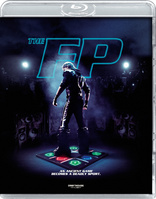
Movie rating
6.5 | / 10 |
Blu-ray rating
| Users | 0.0 | |
| Reviewer | 2.5 | |
| Overall | 2.5 |
Overview
The FP (2011)
Two rival gangs fight for control of Frazier Park -- a deadly arena in competitive dance-fight video game "Beat-Beat Revolution."
Starring: Jason Trost, Lee Valmassy, Art Hsu, Caitlyn Folley, Nick PrincipeNarrator: James Remar
Director: Brandon Trost, Jason Trost
| Comedy | 100% |
Specifications
Video
Video codec: MPEG-4 AVC
Video resolution: 1080p
Aspect ratio: 2.35:1
Original aspect ratio: 2.39:1
Audio
English: DTS-HD Master Audio 5.1
English: Dolby Digital 5.1
Subtitles
English SDH
Discs
25GB Blu-ray Disc
Single disc (1 BD)
Digital copy (as download)
Playback
Region A (B, C untested)
Review
Rating summary
| Movie | 1.5 | |
| Video | 4.0 | |
| Audio | 3.5 | |
| Extras | 3.5 | |
| Overall | 2.5 |
The FP Blu-ray Movie Review
Send 'Em Back to the Warriors
Reviewed by Michael Reuben June 18, 2012There's a difference between a cult classic and an inside joke, but the makers of The FP don't seem to know that. Cult classics reach beyond their circumstances to touch viewers who know nothing of the film's origins. Such films may not be mainstream, but they have enough of a common touch to speak to an audience who may share little with the filmmakers. The early word-of-mouth fans who turned The Rocky Horror Picture Show into a midnight phenomenon probably didn't know that the film was based on a successful British theater revue, but they recognized the cheesy creature feature references and giggled over the cheerful flouting of sexual mores (which felt very cutting edge in the mid-Seventies, as the country recovered from Vietnam and the Sixties counterculture). The rock-flavored score established a common language that almost anyone could recognize, no matter how bizarre the proceedings on screen. By contrast, an inside joke has to be explained, and those who aren't in the know can only sit by and feel excluded. A film composed entirely of inside jokes virtually requires an instruction manual for the non-cognoscenti—which brings me to The FP, the latest in a line of "instant" cult classics. At least, that's what the copious supplemental materials claim, but the film left me so confused about its intentions that, just as one example, I couldn't even decide for its 83-minute running time whether or not it was intended as a comedy. According to the extras, it is. That I should need to consult outside sources to know for sure is indicative of the film's problems. The FP was a passion project of the Trost Bros. a/k/a Jason and Brandon Trost, who, as sons of veteran special effects coordinator Ron Trost, are film industry insiders. Brandon is an up- and-coming cinematographer, with credits that include Crank 2: High Voltage, Rob Zombie's Halloween 2 and the current That's My Boy. Jason dropped out of film school after a day, because he preferred to spend the tuition on the short films he was already making, including the original concept for The FP. Both brothers wrote and directed, Brandon photographed, and Jason starred. A third Trost sibling, Sarah, did the costumes. Father Ron's barn served as production facility, soundstage, dressing rooms and dorm for cast and crew, while Ron himself rigged and directed the film's major effects sequence. The FP was a family affair. More than a family project, though, The FP was a hometown shout-out, or at least that's what the Trost Bros. would have you believe. The title's abbreviation stands for "Frazier Park", a town an hour's drive and a world away from Los Angeles, where the Trost family had a home and the brothers grew up. The FP is a bizarre sort of tribute, though, because it borrows heavily (and consciously) from Walter Hill's 1979 urban street classic, The Warriors, which expressed that era's fear that American cities were descending into chaos. The FP does the same for Small Town, U.S.A. And the solution? Liquor and ducks. No, I'm not kidding.
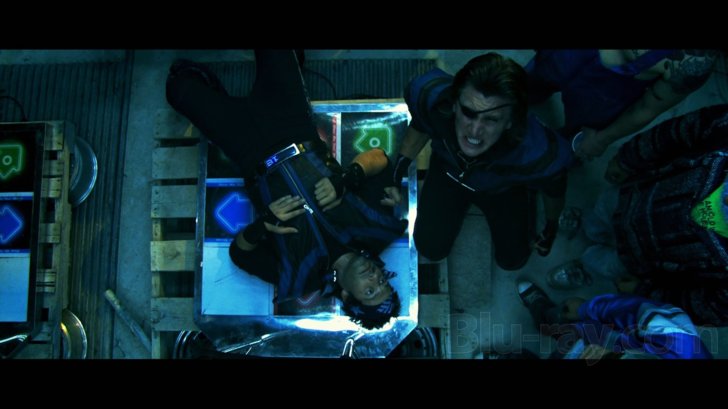
The horror. The horror.
An opening voiceover by James Remar informs us that an underground war for control of the FP has raged for years between two "clans": the 248 from the North and the 245 from the South. The significance of using Remar's voice is that he co-starred in The Warriors. If you see his name in The FP's advertising, be warned: Two sentences of opening narration are his sole contribution to the film. The dystopian wasteland of the film's FP belongs to no definite time period. It could be the present, the near past or the near future. The only obvious characteristic is that social order has broken down, authority figures such as police are absent, and poverty is rampant. The most powerful man in town is the owner of the local liquor store, because alcohol is considered a social "good"; it makes misery tolerable without the violent side effects of the drug trade. (Hey, I didn't write it.) The main form of gladiatorial combat between the 248 and 245 is a dance-fight video game called "Beat Beat Revolution" (which really exists). In the opening sequence, a confrontation between the two gangs' opposing champions results in victory for the 245's evil leader, L Dubba E (Lee Valmassy), and the death of his rival. The 248's future hope, JTRO (Jason Trost), is so traumatized that he goes into exile as a logger, until he's found a year later by his friend, KCDC (Art Hsu), and persuaded to return and confront the growing power of L Dubba E. Once back in The FP, JTRO discovers even greater incentive to defeat L Dubba E in the person of Stacy (Caitlyn Foley), for whom JTRO always had feelings but who is now L Dubba E's "bitch". Also, L Dubba E has taken over the local liquor store and restricted the flow of spirits. Drug use is growing in The FP, and all the winos have disappeared from the parks. With no one to feed them, the local ducks have also disappeared. "What's a town with no ducks?" bemoans KCDC. The bulk of the film involves JTRO training and preparing himself for the showdown with L Dubba E. Jason Trost claims that the story "beats" are identical to the original Rocky, and you can certainly see it in the training montage. Other obvious influences are dance competition films and the post-apocalyptic genre represented by the Mad Max series and Escape from New York (whose anti-hero, Snake Plissken, wore an eye patch much like JTRO's). And hip-hop—let's not forget hip-hop/gangsta films, as reinterpreted by white kids trying to talk tough. This is the film's single most pervasive and irritating element. In one of the best scenes from the 1998 high school classic, Can't Hardly Wait, the cynical Denise (played by Lauren Ambrose) tells the would-be hipster, Kenny: "There's a mirror right there. Take a look, you're white!" In this age of Blu-ray interactivity, one yearns for an app that would insert Denise into random scenes of The FP to remind the Wonderbread wonders of Frazier Park that misogyny, trash talk and frequent repetitions of "nigga" (even when it's redefined as an acronym for "Never Ignorant Getting Goals Accomplished") don't enhance their street cred, reinvent their origin, or improve their stature. Worse, they don't even sound credible, because the actors—including writer-director Jason Trost—aren't skilled enough to deliver this artificial patois as if their characters actually spoke it. It's unnatural, like a foreign language in which the speaker isn't fluent or Shakespeare recited by actors who don't understand what the words mean. Just how stilted is their delivery becomes obvious during the minute or so that Clifton Collins, Jr. appears as CC Jam, a drug peddler and gatekeeper for the 245. Collins, who's done this sort of thing before in The Replacement Killers and is a far more experienced actor, makes CC Jam sound like a real guy who actually talks that way. The rest of the cast are just actors striking a pose. On the commentary track, the Trosts defend their dialogue by claiming that 80% of it is real; it's "shit we've heard at parties" in Frazier Park. (Somewhat inconsistently, they also claim they made up a lot of the slang.) But that's a poor excuse. Daily life transcribed makes banal storytelling. The art of writing, whether dialogue or narrative, is to create something that sounds real, but is better: more concentrated, more revealing, more organized for a narrative purpose. (The complementary art of acting is to speak such dialogue as if it were a spontaneous act.) I have no idea what The FP's dialogue is supposed to be. Very little is needed for exposition; rarely is it funny (though the Trosts seem to think otherwise); and none of its rises to the kind of obscenity-laden poetry that one finds in, say, Tarantino or Mamet. It quickly becomes as grating as a bad comedy sketch that's gone on too long. Then again, how can one expect dialogue from writers who early on declare their indifference to plot? The incident that sets the entire story in motion is the early confrontation with L Dubba E in which a member of the 248 dies and JTRO is traumatized. Literally everything in the film flows from this event, which means that it's critical for the audience to experience JTRO's trauma fully, even if the film is a parody. Instead, my viewing companion and I were thoroughly distracted, because we were asking each other whether we'd missed something: "What killed him? He was playing a dance video game, and suddenly collapsed? Huh?" Apparently we're not the first to wonder, because on the commentary Jason Trost explains:
Whenever anyone asks, like, why did he die?, it's like, shit's tough in The FP. That's the only excuse you need. Like, we could go on, oh his lungs collapsed or he had a heart attack, and I don't—no. Shit's just tough in the FP, and that's the answer. That is why he died.Now, lots of good filmmakers leave mysteries and loose ends for audiences to ponder, but not when it comes to the essential premise of their story. When you're getting viewers situated in a narrative, that's precisely when you don't want them wondering about basic things like cause and effect. Imagine if, in The Warriors, the gang leader Cyrus had simply fallen down dead, and the Warriors had gone running for Coney Island with no explanation of why everyone was after them. By Trost's logic, that would be fine, because, hey, they're gangs, they're violent, people get killed—and that should be enough explanation. That the Trosts are indifferent to such matters, yet go out of their way to show L Dubba E repeatedly trying to coerce oral sex out of a female hostage while he's trying to outrun JTRO during a high-speed car chase, pretty much sums up their narrative priorities.
The FP Blu-ray Movie, Video Quality 
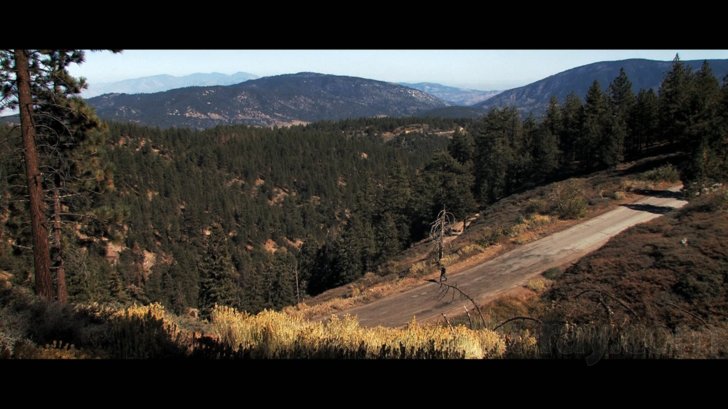
Whatever its shortcomings as film, The FP has been given a generally fine treatment on Blu-ray by Image Entertainment, assisted no doubt by the quality of the original shooting format. Brandon Trost used the same Canon XH-A1 digital cameras with which he was familiar from Crank 2. The budget didn't allow for a full digital intermediate, but the credits indicate some sort of color grading, probably on PCs. The result is a clean, professionally framed and processed digital image with depth, fine delineation of detail and expert framing. The colors of The FP vary widely from the artificial fluorescence of the late night club scenes to the natural splendors of the brightly lit daytime scenes outdoors (mostly when seen in long shots) to the filth and decay of Frazier Park's local environs, especially where JTRO and Stacy live (the latter with an abusive father). The shifting hues are all faithfully reproduced on Image's 1080p, AVC-encoded Blu-ray. Black levels are generally quite good, which is essential for the many scenes in the various clubs and dark interiors. Contrast levels are sufficient to reveal shadow detail without overwhelming it. There was no indication of any high frequency filtering or artificial sharpening, and no compression artifacts of any kind. The only obvious defect was occasional light banding in larger expanses of lighter colors, notably the sky. It's sufficiently subtle that most viewers probably won't notice.
The FP Blu-ray Movie, Audio Quality 
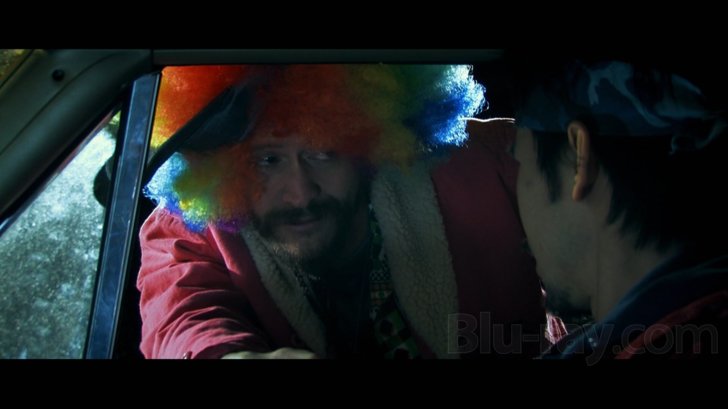
The DTS-HD MA 5.1 track renders the club dance music loudly and powerfully. The same goes for the film's one major pyrotechnic event, which occurs late in the game. For the rest, the sound editing is fairly basic, reflecting budgetary limits. The film relies heavily on the inventive score by George Holdcroft to fill the surrounds and create a coherent listening space. Holdcroft's invention never flags, and his underscoring becomes one of the most significant forces giving The FP a sense of unity. Dialogue is frequently hard to understand, but that's not a fault of the DTS lossless track. As discussed in the main review, the characters speak in a language of their own, which often results in unintelligible exchanges. (As with the recent Monster Brawl, Image has also included a track in DD 5.1 at the oddly low rate of 320 kbps. There is still no explanation of why anyone would want this.)
The FP Blu-ray Movie, Special Features and Extras 

- Commentary with the Trost Bros.: The brothers discuss the film's origin, the experiences of cast and crew living and working together in their father's barn, their history in Frazier Park, and their goals in making the film. It's a revealing commentary, often inadvertently so.
- Never Ignorant Getting Goals Accomplished: The Making of THE FP (HD, 1080p; 2.35:1):
- The Making of THE FP (21:28): The Trost Bros. discuss the origins of The FP, which was initially a short film by Jason, its subsequent development to feature length, their goals (if you can call them that), and the arduous process of shooting the film while living with cast and crew in their father's barn in Frazier Park. Most of the principal cast and crew are also interviewed.
- Designing THE FP: Interview with Costume Designer Sarah Trost (8:06): The third Trost sibling speaks in detail about the elaborate costumes she created from scratch for no money. Many of the details of Trost's work fly by so quickly that they're almost impossible to notice, so that having her point them out is quite entertaining.
- Scoring in The FP: Interview with Composer George Holdcroft (6:09): The film's resourceful composer created whatever the Trost Bros. wanted, including pitch-shifting his own voice to simulate that of a female singer.
- THE FP in The FP: A Return to Frazier Park (HD, 1080p; 1.78:1; 10:30): The Trost Bros. visit their old stomping ground to host a screening of the film. While there, they take the viewer on a tour of locations and down memory lane. A point of note is that, prior to the screening, Jason Trost appears without his signature eye patch.
- Trailers (HD, 1080p; 2.35:1): The red band gives a much more accurate flavor of the film.
- Green Band (2:16)
- Red Band (2:33)
- Booklet: An insert in the Blu-ray case contains essays by Rob Zombie (director of The Devil's Rejects and Halloween 2) and by Mark Neveldine and Brian Taylor, co-directors of Crank and Crank 2, along with publicity still and other photos.
The FP Blu-ray Movie, Overall Score and Recommendation 
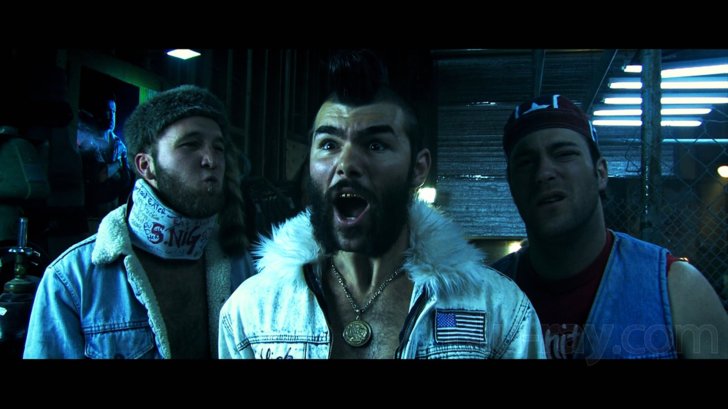
If I could, I'd write the conclusion of this review in the artificial slang that the Trost Bros. have ladeled all over The FP. But I lack both fluency and any interest in gaining it. So I'll just say that, while The FP is more than technically adequate on Blu-ray, it is most definitely not recommended.
Similar titles
Similar titles you might also like

Halloween 4K
2018

Gravy
2015

The Incredibly Strange Creatures Who Stopped Living and Became Mixed-Up Zombies
1964

Poultrygeist: Night of the Chicken Dead
2006

Antibirth
2016

Martyrs
2015

Cabin Fever
2016

Dead & Breakfast
2004

Under the Bed
2012

Masters of Horror: Season One, Volume I
2005

Zombie Strippers
Unrated Special Edition
2008

Strippers vs. Werewolves
2012

Gas Pump Girls
1979

Homebodies
1974

Skinned Deep
2004

Bikini Drive-In
1995

The Greasy Strangler
Special Director's Edition
2016

Blades
1989

The Comedy of Terrors
1963

Revenge of the Cheerleaders
Caught with their Pants Down / Limited to 1000 Copies
1976

